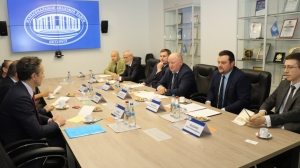Belarusian, Russian polar explorers to expand cooperation

MINSK, 7 September (BelTA) – Belarusian and Russian polar explorers are going to expand cooperation, the press service of the National Academy of Sciences of Belarus told BelTA after a visit of representatives of the Arctic and Antarctic Research Institute (AARI) of Russia's Federal Service for Hydrometeorology and Environmental Monitoring (Rosgidromet).
The delegation included Advisor to the Director for International Cooperation of the Arctic and Antarctic Research Institute Aleksandr Klepikov, Chief of the institute's Russian Antarctic Expedition Pavel Lunev, and Chief Specialist of the expedition's Logistics Center Andrei Mirakin. The purpose of the visit was to review progress of fulfillment of the action plan on realizing the Belarusian-Russian intergovernmental agreement on cooperation in Antarctica in 2022-2023. Plans for scientific cooperation and logistic cooperation in 2023-2024 were discussed. Matters relating to the organization of the 16th Belarusian Antarctic expedition were also high on the agenda.
The Russian guests held negotiations with Deputy Chairman of the Presidium of the National Academy of Sciences of Belarus Aleksandr Kilchevsky. They took part in an expanded session of Belarus' interagency commission on Antarctica affairs and a session of the bilateral working group on discussing results of implementing the Belarusian-Russian agreement on cooperation in Antarctica in 2022-2023. The logistics of delivering cargoes and members of the Belarusian Antarctic expedition in the 2023-2024 season was discussed.
The Belarusian scientists thanked Russian colleagues for constant assistance and informed them about plans to dispatch another Antarctic expedition in November 2023. Further development of the Belarusian station was mentioned as well as scientific content of new programs. In turn, the Russian colleagues said they intend to continue supporting Belarus' efforts to explore Antarctica, including transition to operating the station throughout the year.
The guests also visited a permanent exhibition that demonstrates the academy's R&D products, which are offered for assimilation in the manufacturing sector. They took interest in many R&D products of Belarusian scientists. Those include special plastics that protect from ultraviolet radiation, technologies for cleansing territories, and weather forecast methods. All of them can be useful for exploring Antarctica.













